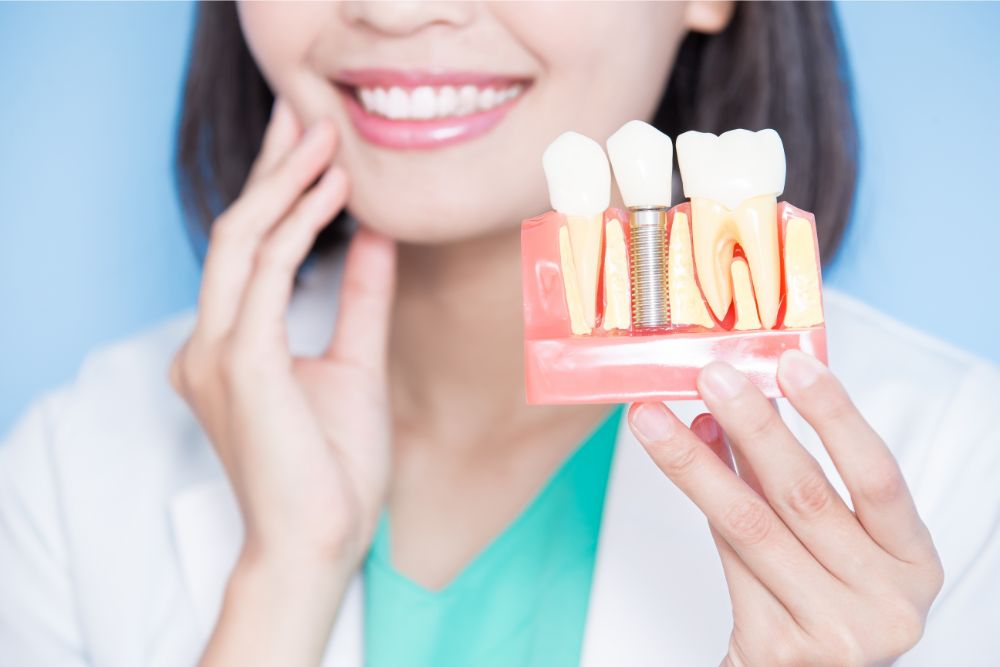Few Americans grew up understanding just how important brushing and flossing were to prevent the painful and expensive repair of teeth and gums that so many experience later in life. But poor oral health has even bigger consequences, since periodontal (gum) infection bacteria can spread throughout the body and significantly increase the risk for diabetes, cancer, cardiovascular disease, and Alzheimer’s.
Teeth Can Fall Out Due to Poor Oral Hygiene
All too late most people discover that inadequate oral hygiene results in teeth falling out, as the infected gums pull away their support. On average those 35-49 have lost three teeth, while at ages 50-64 Americans have an average of five missing.
Missing teeth, whether due to poor dental habits or accidents, cannot simply be ignored because a natural process takes over after the loss in which the mouth causes the neighboring teeth to lean in to “close the gap.” This leads to a misalignment of others on the same arch (the upper or lower set of teeth) and unless replaced soon, more teeth eventually fall out or need to be extracted: a quarter of Americans 75 or older no longer have any teeth.
Missing teeth, whether due to poor dental habits or accidents, cannot simply be ignored because a natural process takes over after the loss in which the mouth causes the neighboring teeth to lean in to “close the gap.” This leads to a misalignment of others on the same arch (the upper or lower set of teeth) and unless replaced soon, more teeth eventually fall out or need to be extracted: a quarter of Americans 75 or older no longer have any teeth.
Natural Tooth Erosion
Most end up wearing traditional dentures, which do not stop the natural erosion of the jaw when teeth are lacking, which is why they have to be periodically refitted to make chewing comfortable and speaking clearly understood.
The good news is that developments in dental implants now make them a potentially permanent solution, since they have a 95-98% success rate and can even last more than 20 years with proper care. That means determining if brushing and flossing can be improved, having a professional cleaning done at least twice a year by a dental hygienist, or adding a water flosser, small picks to clean between tight spaces, or using a dentist-grade mouthwash.
The good news is that developments in dental implants now make them a potentially permanent solution, since they have a 95-98% success rate and can even last more than 20 years with proper care. That means determining if brushing and flossing can be improved, having a professional cleaning done at least twice a year by a dental hygienist, or adding a water flosser, small picks to clean between tight spaces, or using a dentist-grade mouthwash.
Screening Process
But this positive long-term outcome also depends on having an expert start the process of screening the patient to be sure this is the appropriate remedy and that she or he has enough jawbone for an implant, as revealed by a digital x-ray or CT-scan. If more bone is needed, a bone graft will need to be done to strengthen the area underneath the missing tooth.
The implant itself is a cylindrical screw made of titanium, a biocompatible metal, which is created in collaboration with a top dental laboratory. It is then surgically inserted into the empty tooth socket, replacing the tooth root, and over the next few months fully integrates with the jaw, giving it great stability. Then it is attached to a dental crown, which looks exactly like the visible part of the tooth it is replacing.
Periodically, those who have had implants placed will be asked to come into our office so one of our dentists can make sure they continue to function well and contribute to a smile you can be proud of.
If you have already lost at least one tooth or have teeth that are loose, call CITIDental Boston today to set an appointment for a full dental examination and discussion about your best options.
The implant itself is a cylindrical screw made of titanium, a biocompatible metal, which is created in collaboration with a top dental laboratory. It is then surgically inserted into the empty tooth socket, replacing the tooth root, and over the next few months fully integrates with the jaw, giving it great stability. Then it is attached to a dental crown, which looks exactly like the visible part of the tooth it is replacing.
Periodically, those who have had implants placed will be asked to come into our office so one of our dentists can make sure they continue to function well and contribute to a smile you can be proud of.
If you have already lost at least one tooth or have teeth that are loose, call CITIDental Boston today to set an appointment for a full dental examination and discussion about your best options.



